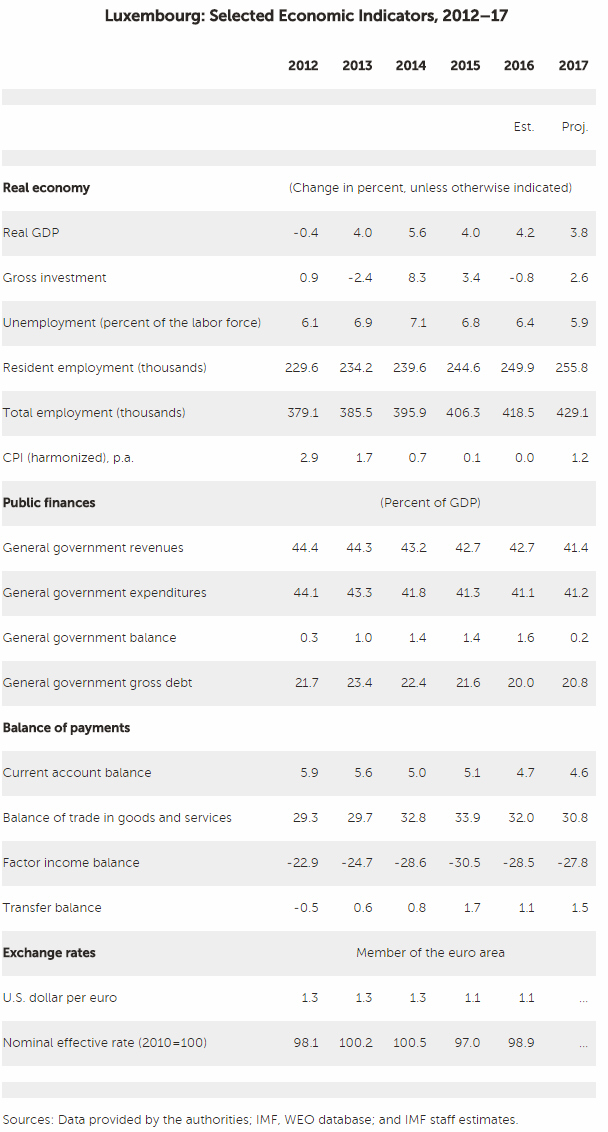IMF Executive Board Concludes 2017 Article IV Consultation with Luxembourg
On May 5, 2017, the Executive Board of the International Monetary Fund (IMF) concluded the Article IV consultation with Luxembourg.
Benefiting from its major role in intermediating international capital flows, Luxembourg has enjoyed strong growth supported by competitive advantages of fiscal stability, a qualified workforce, and business friendly regulations and oversight. Economic growth reached 4.2 percent in 2016, well above the EU average, and was driven by net exports of financial services. Growth is projected at 3.8 percent this year, with continued strong job creation and a pick-up in inflation.
In 2016, buoyant tax revenues due to higher-than-expected economic activity contributed to a fiscal surplus of 1.6 percent of GDP. In 2017, the tax reform is expected to result in a drop in the fiscal surplus and a broadly balanced budget over the medium-term.
Growth prospects are good but are subject to downside risks, including from a retreat from cross-border integration, policy uncertainty in the U.S. and related to upcoming elections in Europe and Brexit that could result in financial market volatility affecting the financial system. Luxembourg also remains vulnerable to lower-than-expected growth in Europe and challenges to the euro area architecture. The ongoing implementation of the international tax transparency and anti-tax avoidance agenda, which Luxembourg has embraced, could weigh on economic activity and tax revenue, but creation of a level playing field could also accentuate its other competitive advantages.
Executive Board Assessment
Executive Directors praised the authorities for their prudent policies and strong institutions, which have underpinned the country’s continued robust macroeconomic performance. Directors considered that growth prospects remain strong, although clouded by downside risks related to a possible global retreat from cross-border integration, international policy uncertainty that could cause market volatility, as well as changing international tax rules. Against this backdrop, continued efforts are needed to further improve the oversight of the financial system, adapt the tax regime to the changing international environment, and implement structural reforms to diversify the economy and further reduce unemployment.
Directors encouraged the authorities to continue to move toward risk-based supervision and to increase resources for entities safeguarding stability of the large and interconnected financial system. Given global risks, they stressed the importance of continuing to strengthen the oversight of investment funds, including on-site and comprehensive inspections, system-wide stress testing, and engagement with foreign regulators where delegated activities are undertaken. Directors advised more active supervision of waivers of the large exposure limit of foreign oriented banks. They welcomed the authorities’ commitment to reinforce the oversight of nonbank holding companies that include banks and to improve risk monitoring. Directors recommended continued close monitoring of risks in the real estate market, and to stand ready to adjust policies if necessary. Directors encouraged an increase in the capital of the central bank to bolster its financial buffer.
Directors commended the authorities’ ongoing commitment to prudent fiscal policies. They endorsed further widening the corporate tax base and maintaining fiscal buffers, including low public debt over the medium term. Directors welcomed the authorities’ proactive engagement to implement the European and global tax transparency and anti-tax avoidance initiatives. They considered that contingency measures should be put in place to address revenue risks that may arise from implementation of this agenda, and from volatile financial flows. Directors also recommended continued reform of the pension system to ensure its long‑term viability.
Directors welcomed the authorities’ structural reform efforts to expand activity beyond the financial sector to enhance the resilience of the economy. They considered that additional product market reforms, active labor market policies, and education reform are needed to support further diversification of the economy, reduce skills mismatches and inactivity traps, and ease supply side constraints in the real estate market.

Source: International Monetary Fund
- 250 reads
Human Rights
Ringing FOWPAL’s Peace Bell for the World:Nobel Peace Prize Laureates’ Visions and Actions

Protecting the World’s Cultural Diversity for a Sustainable Future

The Peace Bell Resonates at the 27th Eurasian Economic Summit

Declaration of World Day of the Power of Hope Endorsed by People in 158 Nations

Puppet Show I International Friendship Day 2020

